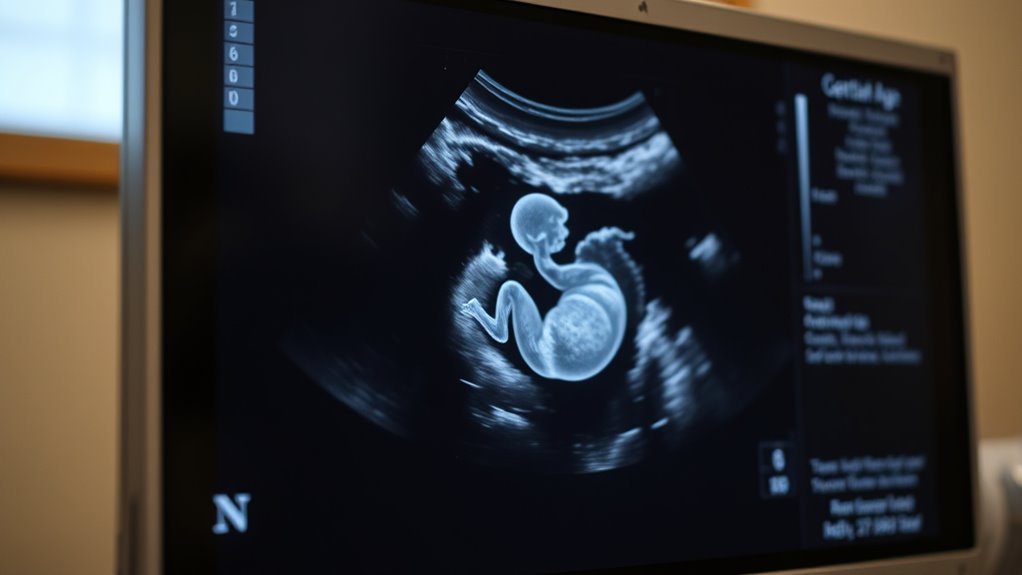Understanding the difference between gestational and fetal age helps you track your pregnancy more accurately. Gestational age begins from the first day of your last period, so it includes about two weeks before conception. Fetal age starts from conception itself, making it roughly two weeks less. Knowing this difference is important for interpreting ultrasounds and tests correctly. Keep exploring to learn how this impacts your pregnancy timeline and care details.
Key Takeaways
- Gestational age includes approximately two weeks before conception, while fetal age starts from conception, making fetal age about two weeks less.
- Accurate understanding of both ages helps in proper pregnancy dating and interpretation of ultrasounds.
- Placental development begins around week three after conception, aligning more closely with fetal age assessments.
- Growth milestones are better tracked using fetal age, especially in early pregnancy, to ensure proper development.
- Clarifying these differences improves communication with healthcare providers and aids in precise pregnancy monitoring.

Understanding the difference between gestational age and fetal age is essential for accurately tracking pregnancy progress. These two terms often get used interchangeably, but they represent different timelines that can impact how you interpret your pregnancy milestones. Gestational age begins from the first day of your last menstrual period, which means it includes about two weeks before conception actually occurs. Fetal age, on the other hand, starts from the day of conception, so it’s roughly two weeks less than gestational age. Recognizing this distinction helps you and your healthcare provider better understand your pregnancy’s development and ensures more precise monitoring.
One key aspect influenced by this distinction is placental development. The placenta begins forming very early in pregnancy, around the third week after conception, and it plays a crucial role in nourishing your baby. When you think about gestational age, you’re considering the entire period during which the placenta is developing and supporting embryonic growth. This timing affects how you interpret ultrasounds and other tests, especially early on when the placenta is establishing itself. If measurements are based solely on fetal age, they might underestimate the maturity of the placenta and its ability to sustain your developing baby. Proper understanding of placental development in relation to gestational age ensures that assessments of fetal health and growth are accurate.
Embryonic growth is another critical factor impacted by the distinction. From conception to about the eighth week, your baby is in the embryonic stage, characterized by rapid development of vital organs and structures. During this period, small differences in timing can greatly influence growth assessments. Since embryonic growth occurs within a timeframe that aligns more closely with fetal age, knowing the difference allows you to interpret early ultrasound measurements correctly. If your healthcare provider is tracking growth based on fetal age, they might adjust their expectations for early development milestones, providing a clearer picture of whether your pregnancy is progressing normally. Additionally, understanding growth milestones helps in planning appropriate prenatal care and interventions. Being aware of timing differences can also help you better understand medical advice and testing schedules, reducing confusion.
Ultimately, understanding the difference between gestational and fetal age is about improving communication with your healthcare team and making informed decisions. It clarifies why certain measurements are taken at specific times and helps you comprehend the stage of your pregnancy more accurately. This knowledge ensures that you aren’t misled by dates that might seem off or confusing. Recognizing how placental development and embryonic growth relate to these timelines helps you appreciate the complex process of pregnancy and reassures you that your baby’s progress is being monitored with precision. In the end, grasping these distinctions empowers you to stay confident and engaged throughout your pregnancy journey.
Frequently Asked Questions
How Accurate Are Gestational Age Estimates?
You might wonder how accurate your gestational age estimates are. Ultrasound accuracy is generally high, especially when done in the first trimester, making dating methods reliable within a few days. However, later ultrasounds become less precise. Factors like irregular cycles or late scans can affect accuracy. Overall, early ultrasound-based estimates provide the best dating methods, helping you and your healthcare provider track your pregnancy progress confidently.
Can Fetal Age Differ Significantly From Gestational Age?
Did you know ultrasound discrepancies can lead to fetal age differing by up to two weeks from gestational age? This variation happens because of dating variability, especially early in pregnancy. You might wonder if fetal age can differ substantially from gestational age, and the answer is yes. These differences occur due to measurement errors and natural growth variations, making it important to interpret ultrasound results carefully for accurate pregnancy dating.
How Does Maternal Health Affect Fetal Development Timing?
Maternal health directly impacts fetal development timing. If your placental health is compromised, it can slow nutrient and oxygen transfer, delaying growth milestones. Poor maternal nutrition can also delay fetal development, as essential nutrients are crucial for proper growth. By maintaining good health, eating well, and monitoring placental function, you help guarantee your baby develops on schedule, supporting healthy birth timing and overall well-being.
When Should I Rely on Fetal Age Over Gestational Age?
You should rely on fetal age during measurement timing and clinical decision making when ultrasound dating is more precise, especially early in pregnancy. Fetal age is based on conception date, providing a more accurate timing for growth assessments. Use it when determining due date or managing complications. Gestational age, calculated from the last menstrual period, may be less accurate if cycles are irregular, so fetal age offers better guidance in those cases.
Do Different Pregnancies Have Varying Growth Patterns?
Different pregnancies do have varying growth patterns, affecting your baby’s development. You might notice differences in growth rate, prenatal milestones, and overall health. Some pregnancies show steady growth, while others may be slower or faster. These variations impact your healthcare team’s assessments and planning. Recognizing that each pregnancy is unique helps you understand why growth patterns aren’t identical, emphasizing the importance of personalized monitoring and care for your baby’s well-being.
Conclusion
Think of gestational age and fetal age as two travelers on a journey—they start at the same point, but their paths differ slightly. Knowing the difference helps you navigate pregnancy with clearer maps and avoid wrong turns. Just like a seasoned explorer, understanding these timelines ensures you’re prepared for each stage, guiding you safely to the destination. Remember, in this voyage of life, clarity about your baby’s timeline makes all the difference.









